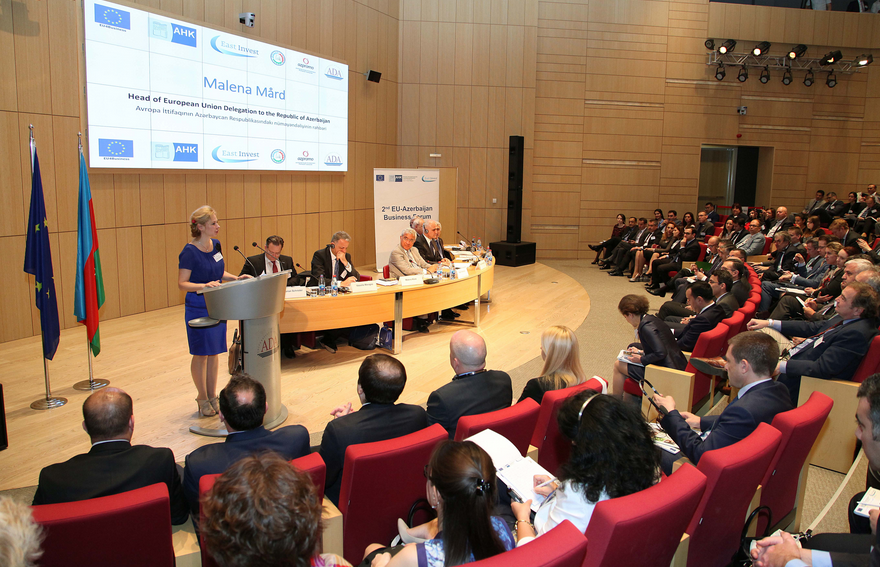EU-Azeri trade pact will be ready in 2019
Euractiv | 18 mai 2018
EU-Azeri trade pact will be ready in 2019
By Benjamin Fox
An EU-Azerbaijan trade and political agreement will be ready for ratification next year, says Javanshir Feyziyev, co-chair of the EU-Azerbaijan Parliamentary Cooperation Committee (PCC).
Javanshir Feyziyev MP spoke with EURACTIV’s Benjamin Fox in Baku, following the recent meeting of the PCC.
EU-Azerbaijan relations were in a very difficult place particularly in 2015 and 2016. But your relations with Sajjad Karim, and the PCC, appear to be genuinely warm. Is it fair to say that EU-Azerbaijan relations have been repaired and, if so, what has changed to make that happen?
Our relations passed through a complicated period in 2014-2016. But we could manage this challenging situation by building a constructive dialogue. And it is quite fair to say that current EU-Azerbaijan relations on the parliamentary dimension are warm and that our relations have been restored. Open and honest discussion made this happen in a short time.
The problem was misinterpretation of the political situation in Azerbaijan within the European Parliament. I thank once again my colleagues from the European Parliament for their sincere, constructive and pragmatic engagement in the restoration of dialogue and further development of relations between the Milli Mejlis and the European Parliament.
How did the meetings go, and what is the role of the Parliamentary Cooperation Committee (PCC), particularly in the context of the talks on a new partnership agreement?
The PCC is the only bilateral format for us to discuss inter-parliamentary relations between the EU and Azerbaijan, as well as to evaluate the level of cooperation between our governments on a parliamentary level. As a rule, the representatives of the executive bodies of both sides are invited to our meetings. The negotiators on the new comprehensive Agreement between the EU and Azerbaijan are present in each PCC meeting to inform us about the current situation on talks.
How are talks on the new EU-Azerbaijan bilateral agreement progressing? What is the timeframe for an agreement being reached?
The new EU-Azerbaijan bilateral Agreement is supposed to cover all political, economic, social and cultural sides to our relations, including trade and investment, human rights and rule of law, education, environment and other sectoral cooperation, including in energy and transport. There is no time restriction, but the negotiators are really making all their efforts to accelerate the process. We believe the governments will be able to finalise talks by the end of this year and a new agreement to be ready for signing in the first half of 2019.
What can Azerbaijan offer the EU and vice versa?
Azerbaijan is the biggest economy of the region, comprising about 80% of the South Caucasus. This is a geostrategic place, situated on the historical Silk Road and connecting Europe with Asia. During the last three decades, Azerbaijan has carried out many giant infrastructure projects to ease regional and continental cooperation. The Baku-Tbilisi-Ceyhan oil pipeline, Baku-Tbilisi-Erzurum gas pipeline, West-East and North-South transport corridors and, finally, the Southern Gas Corridor are the biggest economic projects of the continent, initiated and carried out by Azerbaijan.
The Southern Gas Corridor is the only alternative source for the EU to diversify its energy supply to bring the energy resources of the Caspian Basin and Central Asian countries to the European market. All of these are serving the deepening of multilateral cooperation between all countries of the continent, in which EU must be very interested.
In its turn, Azerbaijan is interested to have EU as a biggest trade partner and supplier of modern scientific-technological know-how.
What does Azerbaijan expect from the EU on the Nagorno-Karabakh dispute?
The Nagorno-Karabakh dispute is a long-lasting conflict in the region imposed on Azerbaijan and Armenia – two independent and sovereign countries, aimed at keeping them away from integration to the European family. It keeps the entire region from development and from following their independent foreign policy.
As the biggest political power of the continent, the EU must be able to contribute to a peaceful solution of the conflict. Azerbaijan expects from the EU a transparent, fair and honest approach toward the situation and contribution to a solution of the conflict in accordance with international norms and principles, within the territorial integrity of the Republic of Azerbaijan.
What is the main risk to EU-Azeri relations? Regional instability, including the role of Russia?
The South Caucasus is a geostrategic region of Europe which is very important for stability and security in the continent. Under the Soviet Union, the region was used as a dividing point between Europe and Asia. After having restored its independence, Azerbaijan has chosen integration to the civilized world and playing a role of the bridge between Europe and Asia. But to carry out an independent policy in the region appeared not to be so easy. We have had an unfair war imposed on us and temporarily lost 20% of our territories.
As a political successor of the Soviet Union, Russia still plays an influential role in the region. Ex-Soviet countries such as Azerbaijan, Georgia, Moldova and Ukraine have got the same problems via the same scenarios.
But I believe globalisation is an irreversible process and no one can prevent societies from uniting their efforts for a peaceful and prosperous future. I am sure that we will restore our territorial integrity in cooperation with the international community and will secure the peaceful existence of the entire region. It will serve the security and stability of the whole of Europe.






